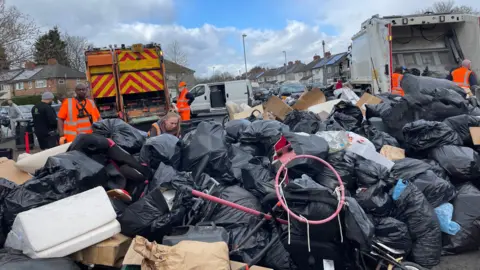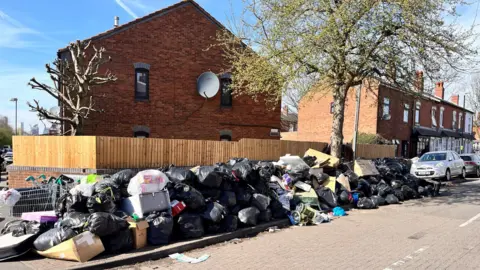BBC News, West Midlands
 BBC
BBCA major incident has been declared by Birmingham City Council over the ongoing bin strike, which has left 17,000 tonnes of waste on the streets.
Leader John Cotton said it was in response to concerns for public health as the authority struggles to clear the rubbish, which has led to the issue being raised in Parliament.
It declaration means the authority can increase its street cleaning operation and fly-tipping removal, by bringing in an extra 35 vehicles and crews.
Unite union members have been on all-out strike since 11 March in a row over pay, and over this latest move bosses accused the council of being “hellbent on imposing” its plan for salary cuts and demotions.
As the strike was being raised in the House of Commons, the government said it was “monitoring the situation closely”.
Mr Cotton said a lot of the difficulty in clearing the waste in the streets had been caused by staff on picket lines who, he said, were preventing vehicles from getting out of depot.

It was “regrettable” the council had to take this step, Mr Cotton said.
“[But] we cannot tolerate a situation that is causing harm and distress to communities across Birmingham,” he said.
“I respect the right to strike and protest, however actions on the picket line must be lawful and sadly the behaviour of some now means we are seeing a significant impact on residents and the city’s environment.
“Unless we declare a major incident and deploy the waste service’s contingency plan, then we would be unable to clear the backlog of waste on the streets.”
 PA Media
PA MediaDeclaring the major incident also allows the council to “work with partners to better manage the risks the city is facing”, which could include increased sharing of data.
Further support from neighbouring councils and the government could also be explored, the authority said.
Speaking in the House of Commons, local government minister Jim McMahon said “well-established arrangements” were in place in the city.
“If local leaders on the ground in Birmingham feel that tackling these issues goes beyond the resources available to them and they request national support, then of course we stand ready to respond,” he said.
“This government will always back local leaders and give them the support that they need.”
However, Kevin Hollinrake, shadow local government secretary, accused the Labour government of being in “total denial” and said declaring a major incident was not enough.
The move came after the Conservatives wrote to ministers to hold urgent talks and send in “strike-busting private rubbish collectors to help clean up the rat-infested rubbish covered streets”.
 Reuters
ReutersNegotiations between the council and Unite were held on Thursday but broke down, with the authority saying all offers on the table had been rejected.
In response, the council said it had launched a period of collective consultation regarding compulsory redundancies.
Unite claims planned restructuring of the refuse service will see some 50 workers lose £8,000 a year, and about 20 lose £2,000 per annum.
Sharon Graham, its general secretary, said that instead of declaring a major incident, the authority could easily resolve the dispute but instead was “hellbent on imposing its plan of demotions and pay cuts at all costs”.
“We can only conclude that this massive pay cut for hundreds of refuse workers is only the start and this is really about stamping out any future opposition to its plans to unleash austerity 2.0 on Birmingham,” Ms Graham said.
“I urge Birmingham council to rethink this disastrous strategy and to find a way forward that doesn’t involve workers and communities having to pay for politicians’ mistakes.”








